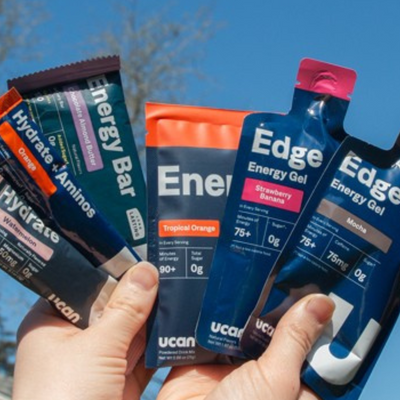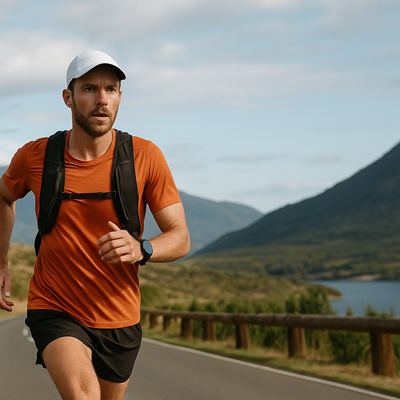Recovery nutrition for runners is key to replenishing and refueling to ensure that you have energy stores available to use one day or even four days later. Running is taxing! Your muscles contract a lot to be able to run and propel your body across the earth. When you run, your body endures 2-3 times your body weight every time you land.
Additionally, the average runner takes 1500 steps per mile. This puts a lot of stress on your muscles, tendons, ligaments, and bones, so recovery should not be discounted. While physical recovery work, like stretching, mobility exercises, and lying down on the couch after your run, is important for proper post-run recovery, what you fuel your body with after running is just as important.
In this article, world-class running coach & exercise scientist Greg McMillan breaks down the basics of recovery nutrition for runners and why UCAN products are ideal for post-run recovery
The Glycogen Recovery Window
Protein supports muscle recovery, but carbohydrates replenish your energy. We have limited carbohydrate stores and if you train for a long time or at a high intensity, you burn through those carbohydrates stores and need to replace them. Focusing on two main components of recovery nutrition can help runners avoid overeating. Within the first 30 minutes, called the glycogen window, you've significantly reduced your carbohydrate (glycogen) stores due to an intense training run and the enzyme that helps restock your stores is ramped up above normal levels.
If you take in carbohydrates within that glycogen window, your body is going to restock carbohydrates faster. This is helpful, because it can take the enzyme up to 2 hours to go back to normal. This can also help curb hunger, so you're not ravenous when you get home.
Every runner has been in the situation where they're just so hungry that they blow off their good nutrition habits and raid the pantry for all the bad stuff. After long or intense workouts, getting carbohydrates with protein into your system will restock the glycogen stores so you can focus on your next meal, usually within two hours after the activity.
The higher the quality of meals, the better the recovery: aim to emphasize balanced, healthy meals that contain high-quality carbohydrates, fats and proteins. If you don’t eat the right kind of fuel, your body’s still going to want more and that’s when you start overeating. Refuel right after you finish that hard workout and then focus on your meal. Immediate post-run recovery fuel combined with a healthy diet will prevent you from feeling under-recovered the next day.

The Importance of Stable Blood Sugar for Recovery
While you may have found a nutrition plan that works for you during your runs, many runners struggle with properly fueling afterwards. The challenge that runners often face with recovery nutrition is either eating too much or too little after a run. The actual number of calories we burn during a run is hard to calculate, so many runners overcompensate by overeating after a training session.
While fueling is important both for fitness and racing success, overeating can be counterproductive if you have weight loss or body composition goals. Runners who under-fuel run the risk of injury and burn out. Runners who over-fuel might not be as fit as they want to be. Runners need to find the happy medium of post run recovery fuel. The answer lies in steady blood sugar & insulin.
Insulin is the most important hormone to manage when trying to maintain or achieve fitness as a runner. You want to avoid simple carbohydrates that cause a big spike in blood sugar, which encourages a big spike in insulin. There are two types of carbohydrates that impact insulin – simple and complex. The simple kind (sugar, white bread, energy gel) can cause a spike in your blood sugar level, which stimulates the body to release a lot of insulin to get the blood sugar level back down to a normal level.
A complex carbohydrate keeps your blood glucose levels much more stable. When you have a big spike in insulin, it inevitably results in more fat being stored. For your post run recovery nutrition, you’ll want to focus on carbohydrates that don’t give you a huge spike in blood sugar (and insulin). After a workout, you will want to focus on a meal that replenishes carbohydrate stores while keeping blood glucose stable, so you don’t have the spike and crash that we’re all trying to avoid.
Follow your post-run UCAN shake with a balanced meal a few hours later and those fats, carbohydrates, and proteins will work together to keep you fit and fueled for your next run.

UCAN Energy + Protein for Recovery
UCAN nutrition products are completely different from the traditional sugar and maltodextrin based sports nutrition products and recovery drinks. The unique ingredient in UCAN nutrition products is called LIVSTEADY, a slower burning, steady-release carbohydrate that keeps blood glucose levels stable while replenishing glycogen stores, helping you avoid spikes to your insulin.
By keeping your insulin levels low, UCAN delivers a calm and steady energy for whatever activity you’re doing. Keeping your blood sugar levels steady is vital for metabolic health, but it is also important for feeling strong after exercise. Controlling your blood sugar helps you sustain your energy for an extended period post-workout so you can still be productive and go about your day, and helps you avoid cravings or the ravenous hunger we often have when we’re not fueling the right way. Running terms like “rungry” or “hangry” are issues that tie back to fluctuations in your blood sugar (specifically, that spike and crash effect). Drinking UCAN Protein + Energy to control your blood sugar can alleviate a lot of these issues.
- Consume 1 serving Energy + Protein within 30 minutes after a long run or hard workout. 1 serving contains 15g LIVSTEADY carbs and 20g of protein (both whey protein and pea protein options are available).
When you use UCAN, you’re working with the body and taking advantage of what the body wants you to do, because all bodies love stable blood sugar. With UCAN, your body simply works better. Your muscles, nervous system, and energy levels will thank you by recovering from a run properly by managing your blood sugar.

3 Easy Ways to Know if You’re Recovering Well
Nutrition has a huge impact on recovery, but taking care of your body involves more than what you fuel it with: take care to stretch and do light mobility exercise after you run and space out your workouts in order to give yourself time to recover. These are three easy ways to know if you’re recovered well.
Mood
How you’re feeling or what your mood is like can be a great indicator of proper recovery. If you're grumpy or moody, you're not recovered or ready for the next session - wait a few hours or a day until your next hard workout.
Energy Levels
Your energy levels are another indicator. Do you feel like you have energy or do you feel worn out? Are you hangry and feel like you could raid the pantry? That's a great indicator that you're not fully recovered. Fuel correctly with a balanced diet and recovery nutrition like UCAN Protein + Energy or an Energy Bar and you’ll feel as good as new for your next run.
Aches & Pains
Any aches or pains in your body or if you feel like you’re taking a long time to warm up are signs that the musculoskeletal system is still trying to recover. If you're not feeling good, then consider delaying your next workout.








